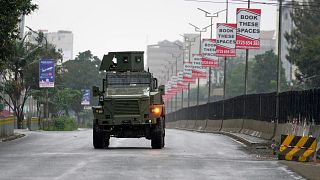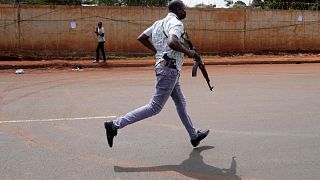Kenya
On the verge of tears, Nathan Nkunzimana recalled watching a video of a child being molested and another of a woman being killed.
Eight hours a day, his job as a content moderator for a Facebook contractor required him to look at horrors so the world wouldn’t have to.
Some overwhelmed colleagues would scream or cry, he said.
Now, Nkunzimana is among nearly 200 former employees suing Facebook and the local contractor, Sama, over working conditions in Kenya that could have implications for social media moderators around the world.
This is the first known court challenge outside the United States, where Facebook settled with moderators in 2020.
The group was employed at the social media giant’s outsourced hub for content moderation in Kenya's capital of Nairobi, where workers screen posts, videos, messages and other content from users across Africa, removing any illegal or harmful material that breaches its community standards and terms of service.
The moderators from several African countries are seeking a $1.6 billion compensation fund after alleging poor working conditions, including insufficient mental health support and low pay.
Earlier this year, they were laid off by Sama as it left the business of content moderation.
They assert that the companies are ignoring a court order for their contracts to be extended until the case is resolved.
Facebook and Sama have defended their employment practices.
The moderators' lawyers are not even sure how long it will take for the case to conclude.
The moderators expressed despair as money and work permit run out and as they wrestle with the traumatic images that haunt them.
The 33-year-old said content moderation is like “soldiers” taking a bullet for Facebook users, with workers watching harmful content on murders, suicides and sexual assaults and making sure it is taken down.
But as the exposure to alarming content reignited past traumas for some like him who had fled political or ethnic violence back home, the moderators found little support and a culture of secrecy.
They were asked to sign nondisclosure agreements.
Personal items like phones were not allowed at work.
After his shift, Nkuzimana would go home exhausted and often locked himself in his bedroom to try to forget what he had seen.
Even his wife had no idea what his job was like.
These days, he locks himself in his room to avoid his sons’ questions about why he’s no longer working.
The salary for content moderators was $429 per month, and non-Kenyans also got a small allowance on top of that.
The Facebook contractor, U.S.-based Sama, did little to ensure post-traumatic professional counseling was offered to moderators in its Nairobi office, Nkuzimana said.
He said counselors were poorly trained to deal with what his colleagues were experiencing.
Now, with no mental health care, he immerses himself in church instead.
Facebook has said its contractors are contractually obliged to pay their employees above the industry standard in the markets they operate and provide on-site support by trained practitioners.
A spokesman said the company could not comment on the Kenyan case.
In an email to the AP, Sama said the salaries it offered in Kenya were four times the local minimum wage and that “over 60% of male employees and over 70% of female employees were living below the international poverty line (less than $1.90 a day)” before being hired.
Sama said all employees had unlimited access to one-on-one counseling “without fear of repercussions”.
The contractor also described a recent court decision to extend the moderators’ contracts as “confusing” and asserted that a later ruling halting the case means it has not gone into effect.
George Nyabuga, a lecturer in media studies at Aga Khan University, said that the court challenge had not only opened the eyes of the Kenyan government and trade unions, but also the international community.
The fate of the moderators lies with the Kenyan court, with the next hearing on July 10.












11:17
Bridging the legal gap in Africa’s digital boom {Business Africa}
Go to video
First Malaria treatment for babies approved
02:16
Kenya's William Ruto faces growing discontent over economy and police brutality
00:28
Nairobi hawker shot at close range by police declared brain dead
01:50
Faith Kipyegon falls short of historic sub-four minute mile but vows to keep pushing
Go to video
Kenya's Interior minister accuses protesters of coup attempt after deadly demos